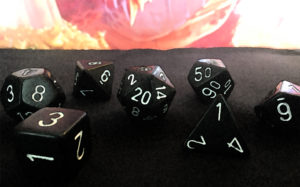TABLETOP RPGS -
PRACTICING THE ART OF STORYTELLING

Storytelling is like any other skill: the more your practice it, the better you become. There are many ways to sharpen one’s storytelling abilities and some are more fun than others. Let’s talk about one of the more enjoyable methods: Tabletop RPGs.
THE BASICS
The best way I can describe Tabletop RPGs to someone unfamiliar with them is that they are essentially video games in your imagination and instead of a computer keeping track of all of your stats and gear, you have to do it with pencil and paper. A game master runs the game and everyone else participates as players. The players create their own characters that then interact with the world created by the game master.
The most famous Tabletop RPG is Dungeons & Dragons, but there are many others including Star Wars, Star Trek, Superheroes, Cyberpunk, Harry Potter, Horror, and even one based off the television show Dallas. Each of these has a unique set of rules that fit into its specific world, but the general idea described in the paragraph above holds true. No matter what your interest is, there is probably a Tabletop RPG for you.
THE BENEFIT OF PLAYING GAMES
So how exactly do Tabletop RPGs teach someone to be a better storyteller? Simple: they force all involved to use fundamental storytelling skills. The players are essentially actors as they are meant to become their characters, thinking and acting as they would. When a storyteller can truly adopt the mindset of varying characters, it makes for a more compelling narrative and players in Tabletop RPGs are forced to use those same storytelling skills.
The game master, meanwhile, has a much more arduous task. He or she needs to do what the players do, but instead of focusing on just one character, he or she has to populate the rest of the game world, create dynamic locations, and weave interesting plot threads to get the players invested.
Being a game master sharpens one’s skills far more than being a player because it invokes all the skills necessary to be a quality storyteller. However, it is more advantageous than writing or filmmaking because the feedback is instantaneous. If your characters are dull, your plot boring, or your locations uninteresting, you as a game master will see your players losing interest and not trying as hard. It’s easy to tell if you’re succeeding, as players will act more in character and want to keep on playing.
In short, Tabletop RPGs are disguises. They require hard work and creativity, but if it’s done correctly, it becomes an enticing game rather than an onerous chore. If you want a career as a storyteller, whether as an author or filmmaker or in some other fashion, then it might be time to try a Tabletop RPG.